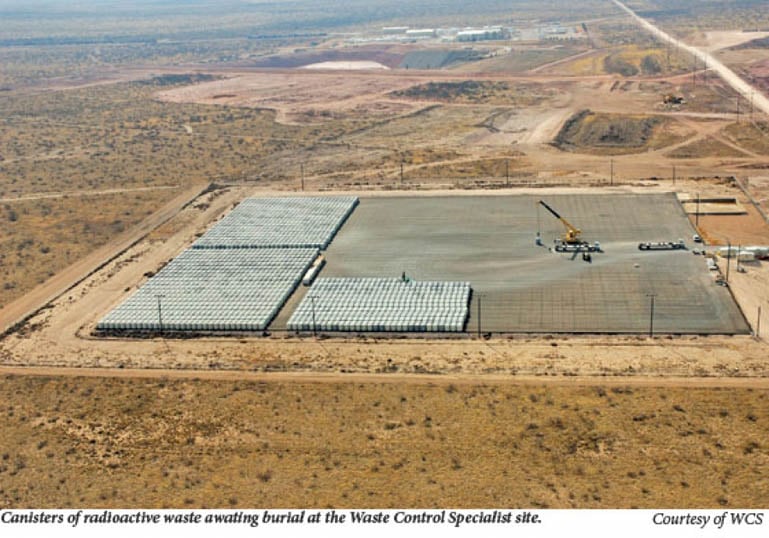Harold & Fraud: Dallas Billionaire Harold Simmons Wins Another Radioactive Favor from TCEQ

Bureaucrats at the Texas Commission on Environmental Quality will be nervously watching the stock market for the next five years. That’s because the agency, in an unprecedented move, has allowed Dallas billionaire Harold Simmons to financially secure his burgeoning West Texas radioactive waste dump with stock in one of his companies.
Critics are calling it the latest in a string of sweetheart deals engineered for Harold Simmons, a major Republican financier and the owner of Waste Control Specialists, the company building the dump. Waste Control stands to generate hundreds of millions, if not billions, in revenue from burying low-level radioactive waste from around the nation. And the company gets to walk away from the dump after its 30-year deal with the state and federal government expires. The feds and state will then be responsible for the dump and at least 28.3 million cubic feet of radioactive waste forever.
In November, the Texas Commission on Environmental Quality agreed to let Waste Control use stock in Titanium Metals Corp., a publicly-traded Simmons company, to cover potential liabilities and ensure that money is available to decomission the facility. After five years, Waste Control is supposed to pony up cash or a traditional, more secure form of security.
Typically, high-risk facilities like hazardous or radioactive waste dumps are secured with a bond, letter of credit or insurance.
Just two months after TCEQ signed off on the deal, a Titanium Metals Corp. shareholder sued Simmons and TIMET (as the company is called) for “self-dealing transactions that were beneficial to sister entities he controlled at the expense of the Company.”
“It’s a polluter’s dream,” said Tom “Smitty” Smith of Public Citizen-Texas. “The only assurance that’s put up is stock in a corporation that is owned by the developer, so that if you screw up and everything goes bad you can go ahead and crash the corpotion and never pay a dime.”
State law requires that operators of risky facilities demonstrate the ability to pay for the costs of closing the facility, monitoring it afterwards and paying for any potential clean-up costs. It’s important, especially, if the operator goes belly-up or leaves the state.
In the case of the Waste Control dump, engineers and geologists with TCEQ have warned that the dump is likely to leak into nearby water tables, including a portion of the vast Ogallala Aquifer. Because of the dump’s risks and the costs of decommissioning, the state-issued license requires that Waste Control come up with about $140 million in financial assurance. Texas law spells out six acceptable forms of financial assurance.
But in July 2010, according to documents obtained by the Observer through the open records process, Waste Control Specialists told the Texas Commission on Environmental Quality that it was unable to obtain any of the six because they were “either commercially unavailable or infeasible.”
It wasn’t just that the credit markets had closed up, though. Waste Control dismissed one option, a fully-funded trust, as simply being too burdensome and expensive. In a March letter to the agency, lawyers for the company said such a trust would require Waste Control to come up with at least $136 million, “a significant financial burden that affects the timing of construction and jeopardizes the availability of the much needed [low-level waste] disposal capacity.”
Instead, Waste Control proposed an “alternative approach” using TIMET stock held by Valhi Corp, another Simmons-controlled company that has a stake in TIMET and owns Waste Control outright. TCEQ, which has rarely said ‘no’ to Simmons, agreed to the basic approach.
On November 3rd, the agency signed off on the deal. The next day, Valhi transferred 12 million shares of TIMET stock to a trust account held by the U.S. Bank National Association.
Tom “Smitty” Smith, director of Public Citizen-Texas, said that Waste Control’s inability to secure financial assurance “speaks for itself.”
“The private insurers and private financiers won’t back nuclear power plants because they’re just inherently too risky. And this is the same deal. [WCS] can’t get an insurance policy or a bond because it’s just too risky.”
Michael Mariotte, executive director of the Maryland-based Nuclear Information and Resource Service, said that the deal would never be allowed under federal rules. “Under [Nuclear Regulatory Commission] rules they would flunk the financial qualifications test and they wouldn’t get the license.”
In fact, Waste Control’s main competitor, EnergySolutions of Utah, has secured its Clive, Utah radioactive dump with a $65 million letter of credit. No other state has allowed an operator of a radioactive waste dump to use stock in a sister company as financial assurance.
The Waste Control arrangement evidently made some TCEQ personnel nervous. An unidentified employee printed off Wikipedia’s entry on “Accounting scandals” and jotted notes in the margins about precipitous declines in stock values of companies like Lehman Brothers and HealthSouth Corporation.
And in July Susan Jablonski, the head of the radioactive materials division, emailed colleagues an article arguing that Simmons was enriching himself at the expense of minority shareholders. The article proved prescient; in January, a TIMET shareholder filed a federal suit against Simmons alleging that he had used TIMET to enrich himself and his other companies.
The agency did build in a few safeguards. Waste Control has to keep extra stock in the trust account to help buffer fluctuations in the stock price. And after five years the stock has to be replaced with cash or traditional forms of financial assurance. And if the value of the Timet stock drops below $10.56 a share, the entire trust account will have to be immediately liquidated. That low was last reached in December 2009.


